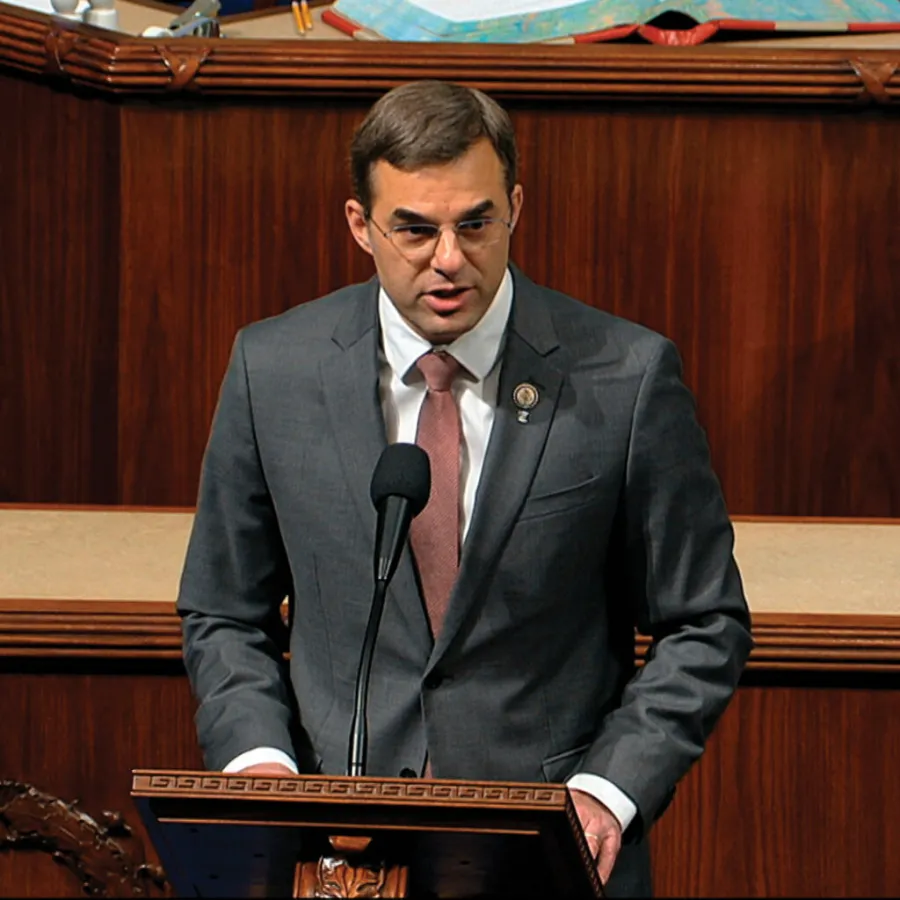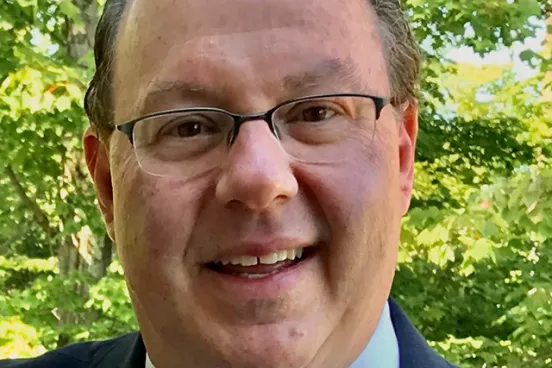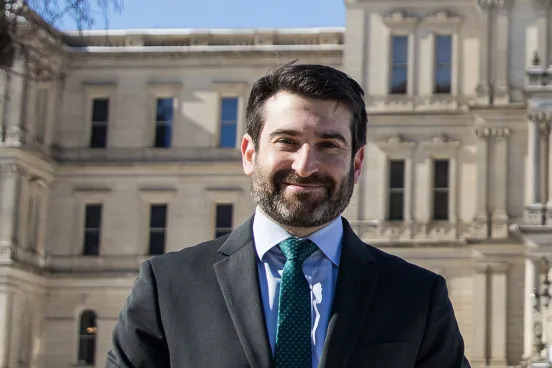
The driving force behind the political views of Justin Amash, ’05, is his strict adherence to the Constitution. The former member of the US House of Representatives says that fervor was born at Michigan Law.
As the son of a Palestinian refugee and a Syrian immigrant, Amash always appreciated the freedoms and principles of the United States. But in Professor Richard Primus’s Constitutional Law class, “I really gained an appreciation for constitutional interpretation, for the ideals this country was founded on,” says Amash, ’05. “His class made me an ardent defender of the Constitution and made me more excited about getting into politics someday.”
“Someday” turned out to not be very far away.
In 2008, just three years after graduating from law school and beginning practice as a transactional lawyer, Amash campaigned for a term-limited seat representing the 72nd District in Michigan’s House of Representatives. Two years after that, he campaigned for a seat in the US House of Representatives.
In both cases, most pundits gave him no chance of winning. In both cases, he proved them wrong.
As the son of a Palestinian refugee and a Syrian immigrant, Amash always appreciated the freedoms and principles of the United States. But in Professor Richard Primus’s Constitutional Law class, “I really gained an appreciation for constitutional interpretation, for the ideals this country was founded on,” says Amash, ’05. “His class made me an ardent defender of the Constitution and made me more excited about getting into politics someday.”
Always Independent
Amash gained nationwide notoriety in 2019, following the release of Special Counsel Robert Mueller’s report, when he became the first Republican congressional representative to say President Trump had engaged in impeachable conduct. He soon left the Republican Party and became an independent; a few months later, he supported impeachment proceedings against the president for abuse of power and obstruction of Congress stemming from his alleged attempts to unduly influence the 2020 election. Amash, who chose not to seek reelection in 2020, was the only non-Democrat to vote in favor of impeachment.
But Amash has always been an independent thinker.
He grew up in a boisterous family that enjoyed vigorous debate. At Michigan Law, he appreciated how even though most of his classmates’ political views skewed left of his own, “we were all able to air strong opinions about things but then be good with each other afterward.”
He ran for the seat in the Michigan House because he was frustrated with how frequently Republicans and Democrats in the legislature voted alike on issues.
“A lot of votes seemed to be the result of lobbyists saying what needed to happen, and there didn’t seem to be a lot of community engagement,” Amash says. “I wanted to show people that a legislator could be independent minded and represent their community.”
As a state representative, Amash made a name for himself by being an early adopter of social media, which he leveraged to be transparent about his votes and to engage his constituents in the process. So when Vern Ehlers, the longtime representative from Michigan’s 3rd congressional district, announced he was retiring from Congress, Amash decided that he had built enough name recognition and credibility to launch a campaign.
“The so-called experts thought only an established politician would have the ability to replace Ehlers, but I believe my victory showed that people do support new, independent thinkers,” he says.
Riding the Tide

In the wake of the success of the tea party movement, 2011 was an interesting time to be a freshman Republican legislator. “There was a giddiness among Republicans on the Hill at that time,” Amash recalls. But at the same time, he says, with dozens and dozens of newly elected Republican representatives in the House, “I think the leadership almost felt like they had won too much. It was hard to get a handle on how to control the rank and file.”
Amash was one of those who proved hard to control. While dubbed one of the most conservative members of the House, Amash has always identified as a libertarian because he believes libertarianism most closely embraces the principles of the Constitution.
“While traditionally my views have fallen more into the conservative camp and I’ve always viewed myself as a constitutional conservative, my positions often depart from what a lot of people think of as conservatism, especially today,” Amash says.
For example, Amash is an outspoken opponent of the USA PATRIOT Act, the legislation that President George W. Bush signed into law in the wake of the September 11, 2001, terrorist attacks. It allows increased government surveillance under the auspices of national security.
In 2015, Amash and Rep. John Lewis [D-GA] co-signed a letter to Senate leaders urging them to reject the House-passed USA Freedom Act, which renewed many of the more controversial surveillance powers. “Here I was, one of the new wave Republicans leading the charge at the time, and I go to John Lewis, an iconic Democrat, asking for help. He says that of course he can help me. His signature was so important in getting other Democrats to look beyond party affiliation and look at the policy—and realize that the policy needed pushback.”

Fix the Problem by Fixing the Process
At a time when American society feels more polarized than it has in a very long time, Amash says we’re not as far apart as we might seem. The division, he argues, is largely the byproduct of a broken legislative system.
“On the whole, I think most Americans embrace a common, classical liberal tradition from which our different philosophies have sprung,” he says.
He blames the top-down control of Congress, where power is centralized in the hands of the ranking leaders of the majority party, for fueling the ever-escalating spotlight grabbing that prevails among today’s elected officials. Social media and 24/7 news channels with prime-time opinion shows provide the spark that lights the fire.
Oftentimes, Amash notes, legislators aren’t even given time to read the legislation. “We’d be told, ‘Here’s a 1,000-page bill; we’re voting on it in a half hour.’ Your job becomes a PR job at that point, not a job where you’re really assessing the validity of the legislation and its value for your constituents. For someone like me, who loved the legislative process and digging into the details, that was frustrating.”
As perhaps the most egregious example of leadership’s grip on the process, Amash points to how little legislation is now considered under an open rule, a process that allows legislators to offer amendments. Instead, amendments must be pre-screened by the Speaker of the House, meaning most don’t make it to the floor.
“Rank-and-file members have very little ability to influence legislation these days,” says Amash, noting that representatives as diametrically opposed as Republican Marjorie Taylor Greene and Democrat Alexandria Ocasio-Cortez are equally stymied in attempts to introduce amendments to legislation. “When you can’t do much of anything to actually move legislation forward, the only other option, as most of them see it, is to engage in theatrics.”
With social media these days being more about politics than baby photos, he says, “these forces have combined to create a Congress that’s based on performance art for the public.”
Beyond Personalities, Back to Policies
As proof that there’s plenty of ideological common ground if the theatrics can be stripped away, Amash points to when he recently interviewed his former professor, Richard Primus, on The Justin Amash Podcast, which he launched in February.
While reviewing his Con Law notes in preparation for the conversation, “I was in awe of how much I agreed with [Primus’s] ideas, even though we came to those ideas from different places,” Amash says. “Many of the things he taught me, I then taught my staff in Congress.”
Those notes, he says, offer a microcosm of what America still is at its core: “You see that classical liberal link between libertarian thought, progressive thought, and conservative thought.”
The key to pushing past the country’s current legislative quagmire, he says, is to reopen and reinvigorate the deliberative process. “If we want to get back to a world where we’re talking about policies rather than personalities, you have to let everyone participate. Allowing the legislative process to work will disempower the theatrics.
“I spend a lot of my time talking about this now because I want people to care,” he adds. “When people vote, they should care just as much about the candidates’ views on process as they do about their views on the issues.”







